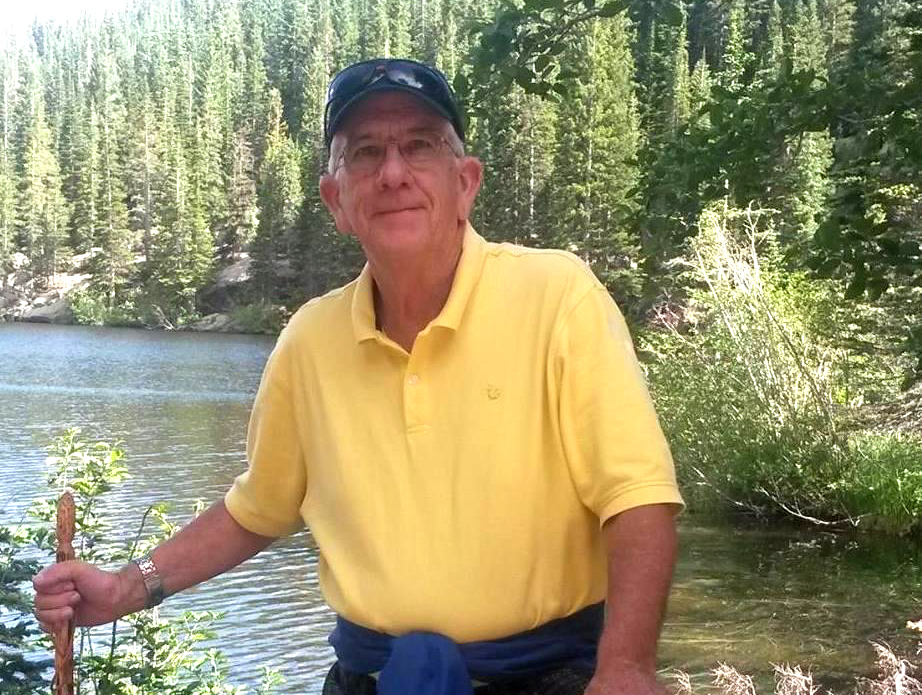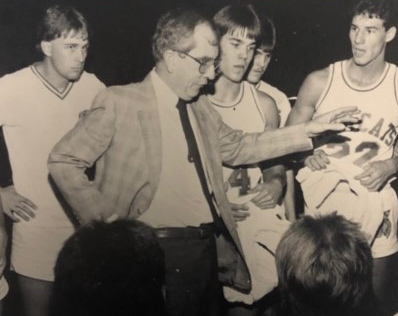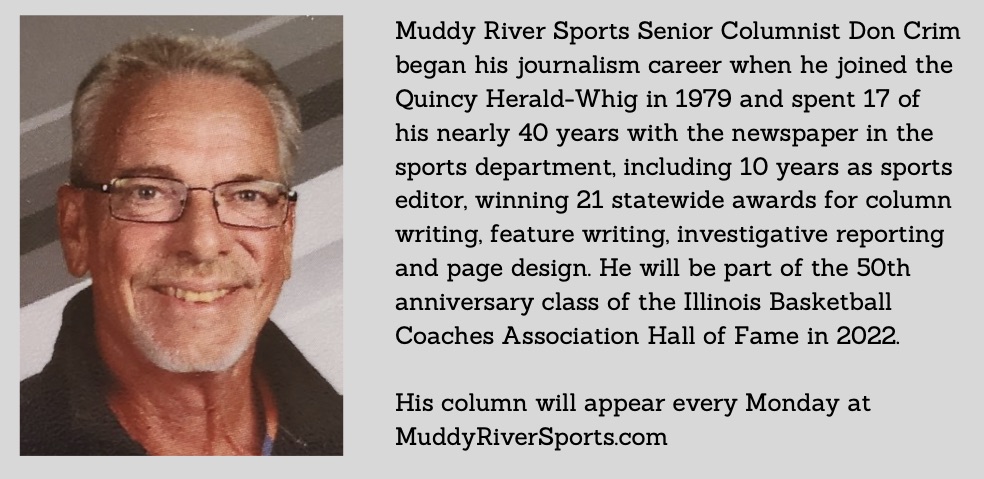Crim: Walton’s journey brings him home, where teaching and coaching made for a fulfilling career

CANTON, Mo. — Rod Walton quietly moved back to Canton last month, a place he called home during a 30-year association with Culver-Stockton College.
He spends his days visiting with old friends, some former high school basketball coaching colleagues, and other old C-SC hands he remained in contact with after retiring in 2012. He tries to get in an hour-long walk along the Mississippi River to remain active as he approaches his 75th birthday.
“I needed a place to hang my hat,” Walton said of his decision to return here. “I have stayed in touch with friends who are still at the college. I’m afraid if too many people find out I’m in town they may want me to do this, that or another. I’m not sure I want to. I may do this and that, but not the other.”
Walton wore many hats during his three decades at Culver-Stockton College. He arrived in 1983 as the head men’s basketball coach, a position he held for seven seasons. He coached golf for 11 years and stepped in to serve as athletic director for seven more after a tornado ripped through the campus in 2003.
He also was a psychology professor, first part-time when coaching basketball and then full-time after he relinquished that role, eventually rising to being the head of the department. He served as the faculty athletic representative for 11 years.
“I enjoyed teaching,” Walton said. “The amount of money kids were paying to be there meant they wanted to be there and wanted to learn. Any time kids are motivated to learn, it’s easy to teach. I didn’t have a lot of the problems teachers have in high school where kids are not motivated to learn.
“What I miss most is academic and career advising. Believe it or not, I still get asked by former students of mine to make calls to employers. That perks me up once in a while. I have been an advisor for several nieces and nephews in college. A great-niece told me I ought to still be working.”
It has been quite a journey for the youngest of nine kids who grew up in Niantic, Ill., graduated from Illinois State University in 1969 with a degree in health and physical education and a minor in history, and harbored ambitions of coaching.
“I grew up loving basketball, but I was a baseball fanatic,” Walton said. “I wanted to be a baseball coach. Then I realized a high school baseball coach in Illinois is basically a groundskeeper. Spring weather meant you couldn’t always play that many games. So, I became more involved with basketball.”

He landed a job with the Brown County School District in Mount Sterling, Ill., spending three years coaching multiple sports and teaching in the middle school and one year at the high school. His sophomore basketball team posted a 23-2 record his final season there.
“I was playing golf in Mount Sterling,” Walton said. “I ran into Norm English, who was the head coach at Payson (and was leaving after two seasons). He asked if I had any interest in the job in Payson. If ever I was going to move on, I figured now is the time.
“I applied, went down for an interview and got the job. Over 100 applied for the job. Leigh Conover and Steve Spanich were the other two board interviews. I respect Leigh as much as anyone in the coaching field and we all know what Steve Spanich accomplished.
“We had quality players who wanted to work and a community that really loved their basketball.”
Payson fashioned a 128-29 record during Walton’s six seasons there, winning the Pike County Conference title outright twice and sharing it three other times. Nine of those losses came in his first season.
Payson just could not get past Quincy Notre Dame in the Class A regional. In 1978, the Raiders were bounced by Liberty in the semifinals, but the top-seeded and 24-1 Indians lost to the Eagles in four overtimes in the regional title game.
However, Payson won its first 27 games the following season to capture the first regional title in school history and advance to the sectional, where the run ended with a loss to Havana in the championship game.
Just 32 and with a good pipeline of players coming up, Walton decided to leave Payson to head to Nicholls State in Thibodaux, La., to work on a master’s degree in psychology and serve as a graduate assistant with the men’s basketball team.
“It was maybe an opportunity of a lifetime, to get a master’s degree and get paid to do it,” he explained. “I think (Payson) would have been similar the next two years with the good, young kids we had coming. But I wanted to give college coaching a try.
“I knew if it didn’t work out that I could always be a counselor in a high school.”
After two years at Nicholls State and with a master’s degree in hand, Walton learned that assistant coach Bob Kivisto had left Quincy College, creating an opening on Sherrill Hanks’ staff.
“I knew (Hanks) pretty well from the time I was at Payson, so I gave him a call to see if he had anybody in mind,” Walton said. “He had me come up to talk about it. He gave me an opportunity. He was very intense. I learned more about how to conduct a practice and work hard.”

Walton spent one season at QC. In 1983, he received a call from Gene Hall, the athletic director at Culver-Stockton. Hall had been instrumental in helping Walton get the graduate assistant job at Nicholls State, and now he wanted to gauge his interest in taking over the Wildcats’ program.
“Gene told me academics came first, which is what I was all about,” Walton said. “It was a good fit.”
Culver-Stockton posted a 118-80 record during Walton’s seven seasons. His best year came in 1984-85 when the Wildcats went 23-7, finished second in the Heart of America Athletic Conference and upset Missouri-Kansas City in the first round of the NAIA District 16 playoffs.
Walton was able to recruit players from high schools in West-Central Illinois to Culver-Stockton, largely because it had an agreement with John Wood Community College that allowed students to pay JWCC tuition rates the first two years. Graduation rates were high and attendance at home games rose.
It was an exciting time for Culver-Stockton basketball.
However, coaching and recruiting and teaching each semester was a grind. Culver-Stockton was consistently among the top two or three teams in the HAAC, but it didn’t provide the financial resources other league schools did to consistently get to the national tournament.
In fact, Walton had only $12,000 in scholarship money to spread across the roster during his final season in 1989-90.
“It wore me out,” Walton said. “I didn’t have a full-time assistant, didn’t have a full-time trainer, had to drive the van to games, was teaching 9 to 12 hours in the classroom. It was difficult.
“I was having a great deal of stomach trouble because of the stress of the job. My doctor suggested I should do something different if I wasn’t going to change. I did enjoy teaching, so I went to our president. He told me if I would coach one more year there would be a full-time job for me in the psychology department.”
So, Walton coached one more year, gave up coaching basketball at the age of 43 and never regretted it.
“I was very happy with my career,” he said. “I had 10 years in public schools and 10 years at the collegiate level. It was time to do something else. I enjoyed my time doing other things. I missed summer camps and working with kids all over the area, but I did not miss coaching basketball at all.”
Walton did stay involved in athletics through coaching golf and serving as the faculty athletic representative. Then, after a tornado tore through the campus hours after graduation ceremonies in 2003, former Culver-Stockton President Robert Brown approached Walton about filling the vacant athletic director job.
“Dr. Brown called me up and put some pressure on me,” Walton said with a laugh. “I had a lot of respect for Robert Brown. He said we had to rebuild the fieldhouse and we needed someone who knew everybody in our conference.
“It was a totally thankless job that was very frustrating. Everybody else in our conference were making improvements financially and with resources. The two people I reported to had a Division III mentality, where athletics was more about participation than competition. They were honest with me about it.
“That wasn’t the same philosophy I had, or the coaches had. It took a new president (Richard Valentine in 2009) to see the importance of being competitive. They have made tremendous strides here at the college.”
Walton vacationed in Colorado in the mid-1970s and fell in love with camping and hiking and watching wildlife in the mountains. He learned about the YMCA of the Rockies, spread out over 800 acres near Estes Park and Rocky Mountain National Park, and applied for a seasonal position a year before he retired from Culver-Stockton.
“I went out there for three months and really liked it,” he said. “They give you room and board and pay a few dollars an hour. The place is family oriented, and you’re surrounded by wonderful people. They have over 800 staff members.
“I had a position after I retired and did it for nine years. Even though I was 65 I wanted to stay active. I’d go out the first of April and come back the first of October to spend time with family in wintertime. Go out there the last week of September when the Aspen trees turn yellow, it’s the most beautiful place in the world.
“It just got to the point with the elevation where I couldn’t do it anymore.”
Now he’s back in Canton, a comfortable place to “hang his hat.” Three of his siblings live in Central Illinois and a fourth in Wisconsin. The oldest is 93. And there are nieces and nephews and other family to visit.
He can swap stories about coaching high school basketball in West-Central Illinois in the 1970s when the likes of Quincy High School’s Jerry Leggett, Southeastern’s Mike Fray, Liberty’s Paul Kreke, Pittsfield’s Dave Bennett and Pleasant Hill’s Harry Wagy were patrolling the sidelines.
Or tell about former college students who used their education to serve them for the rest of their lives. Walton always saw himself as a teacher first, on and off the court.
“I’ve had some very rewarding experiences,” he said. “Now I just stay as busy as I want to be.”

Miss Clipping Out Stories to Save for Later?
Click the Purchase Story button below to order a print of this story. We will print it for you on matte photo paper to keep forever.
